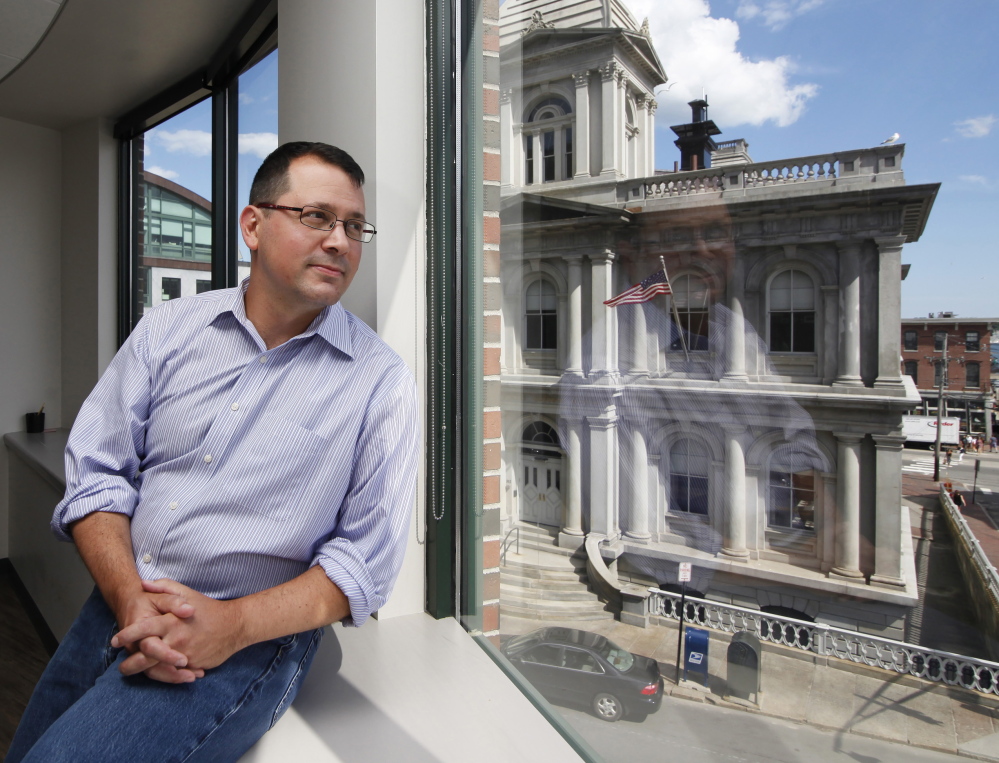CashStar, the Portland-based pioneer in the digital gift-card industry, has raised $15 million that will allow it to hire more people and continue to grow its business.
The company, which moved into new larger offices on Pearl Street last year, provides digital gift cards and incentive programs to a wide array of high-profile national retail businesses, including Starbucks, Banana Republic and Williams-Sonoma.
It currently employs roughly 125 people, the vast majority of whom are located in the company’s Portland headquarters, said Ben Kaplan, CashStar’s CEO.
The fresh infusion of $15 million in venture capital, which brings the total raised to $50 million since its 2007 launch, will allow the company to invest in product development and client services, Kaplan said. When it comes to technology companies, that basically means investing in people, he said.
Kaplan estimates CashStar will add between 30 and 50 employees, mostly in technical positions such as software engineers and project managers, in the next year and a half.
“We’ve got way more work and opportunities than we can possibly tackle,” Kaplan said. “It’s an incredibly vibrant and dynamic market. We are absolutely tapping out our capacity, both in terms of new product development and other opportunities that we have identified.”
FTV Capital, an investment firm with offices in San Francisco and New York City that has invested in CashStar in the past, led the $15 million Series D round. Joining FTV Capital in pouring more money into CashStar are existing investors Passport Capital, Intel Capital, North Hill Ventures and one new investor, Mosaik Partners, which invested $5 million.
Miles Kilburn, a founding partner of San Francisco-based Mosaik Partners, said CashStar came onto his radar a few years ago after other venture capital firms like FTV Capital invested in the company. He said the company met all the criteria that his firm, which focuses on payments and financial technology, or “fintech,” companies, looks for in an investment: a company with a good management team focused on “really big markets.”
“If you just take that large, established market of physical gift cards and ask what are our kids going to be doing in the next generation, it’s clear they’ll be using their mobile phones to buy and gift digital money,” Kilburn said. “And we think CashStar is the leading innovator in that space, and attacking this very large and untapped market that’s emerging gives them tremendous opportunity for growth.”
CashStar also has a competitive advantage because it got into the space early, evidenced by its “unparalleled” roster of clients, Kilburn said.
“They’ve got a real first-mover advantage from my perspective,” he said. “That has allowed them to get into sophisticated enterprises like Starbucks and others, and get ahead of their competition in terms of technology and security and risk management.”
Physical gift cards, whether the paper or the prepaid-plastic variety, are a fairly easy concept to grasp – pay for gift card, give it to someone else to spend at the retailer. But bringing the gift-card concept into a digital realm opens up an array of opportunities for retailers to accomplish other business goals, such as developing customer loyalty and incentive programs, boosting in-store sales and driving new product launches.
CashStar has positioned itself well to help retailers develop programs and campaigns to accomplish those goals, said Brian Riley, a senior research director who tracks gift card trends for global research firm CEB Tower Group.
“They are a top-tier provider … and a highly respected company in this space,” Riley said.
READY FOR THE NEXT EVOLUTION
In 2014, consumers spent $6 billion on electronic gift cards, according to data from CEB Tower Group. That only represents a small portion of total gift card sales, which was roughly $124 billion that year. But Riley said the growth potential for “e-gifting” is impressive. He estimates that electronic gift card sales will more than double to $14 billion by 2017.
Driving that growth is consumers’ wider use of mobile phones to make payments (think Apple Pay). Mobile sales currently account for only 8 percent of total retail sales, but that will grow, Riley said. When people become accustomed to paying for things with their phones, whether with something like Apple Pay or a retailer’s specific mobile app, electronic gift cards essentially become branded digital currency that people can send to each other with the ease of sending a text message.
“When that number starts moving, that will make electronic gifting take off,” Riley said. “It won’t be e-gifting driving digital payments, it will be digital payments driving e-gifting.”
CashStar is poised for that shift. It posted $15.8 million in revenue in 2013, according to the 2014 Inc. 5,000 list, which ranks the fastest-growing private companies in the country. The company reported record-setting revenue growth in 2014, but Kaplan, who joined the company as CEO two years ago, wouldn’t provide details.
“As we’ve scaled, and also with my arrival, I wanted to hold that information a little closer to the vest,” Kaplan said. “What I can say is the company has continued to have really tremendous growth.”
He expects year-over-year revenue growth of roughly 50 percent in 2015, and that the company will be able to reach $100 million in revenue within the next four years.
“I’m more confident and excited about the business than at any point in the last two years,” Kaplan said.
SMART HIRING, MANAGING GROWTH
That’s not to say there aren’t challenges ahead.
Kaplan said the company has been successful in hiring local talent, including software engineers, in Portland, but that could become more of a challenge as the company expands and competes with other growing technology companies for workers.
“I don’t doubt with continued growth (that) that will become more challenging and we may need to draw from other markets, such as the greater Boston area, but overall we feel really good about finding the talent we need in the Portland area,” said Kaplan, who lives in the Boston area and commutes to Portland a few days a week.
Other challenges that companies like CashStar face include managing fast growth while fending off bigger companies who move into the digital card space as the opportunities become more tangible, said Mosaik Partner’s Kilburn, who has joined CashStar’s board as an observer. Although he’s confident in Kaplan and the CashStar leadership team, he also said preparing for those challenges is where experienced investors and board members can add valuable insight.
Kaplan agreed. He said investors like Kilburn and Chris Winship, a partner in FTV Capital’s San Francisco office, bring more than money to the table. They have decades of experience in the payments and fintech space both as investors and company executives. For example, Kilburn has more than 20 years of experience, including an executive role in leading payments company Concord EFS to a $7 billion acquisition by First Data in 2004. Kaplan and CashStar also benefit from the expertise and leadership of Steven Boal, a founder of CashStar and board chairman. Boal is CEO of Coupons.com, based in Silicon Valley.
“As a CEO, having those different perspectives on our board and among our investors is very valuable,” Kaplan said.
As for Kilburn, he’s looking forward to using his experience to contribute to CashStar’s success.
“I think CashStar is emerging as a great company, a great brand with a bright future and we’re happy to be part of it,” Kilburn said, who just booked a flight to Portland in a few weeks for a CashStar board meeting. While he’s here, Kilburn plans to learn more about other innovative Portland-based fintech startups.
He didn’t blink an eye over CashStar’s location in Portland, rather than a place like Silicon Valley or Boston. Kilburn said he invests in good companies wherever they are.
“Finding the right teams is much more important than finding the right place,” he said. “I find these satellite areas, or clusters if you will, ripe for innovation.”
Send questions/comments to the editors.




Comments are no longer available on this story